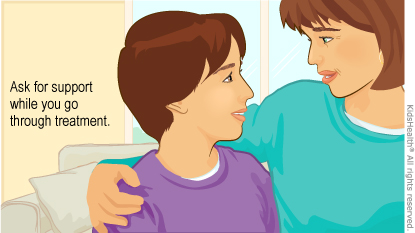Bulimia (also called bulimia nervosa) is an eating disorder where someone eats a lot of food in a short period of time (called binging) and then tries to get rid of it to prevent weight gain. Treatment for bulimia (boo-LEE-mee-uh) can help you have a healthy weight, develop healthy habits, and change the way you think about food and your body.

Follow the care team's recommendations for:
- your meal plan, which will tell you what you should eat in a day to stay healthy
- whether you need any medicines, nutritional supplements to increase calories, or vitamin supplements
- whether it's OK for you to exercise and what kinds of exercise you can do
- whether you should weigh yourself
- setting limits for social media use
- going to follow-up care visits
Practice healthy eating habits by:
- not skipping meals (People are more likely to overeat if they get too hungry.)
- practicing mindful eating (paying attention to what you eat and noticing when you feel full)
- identifying triggers (Some people binge eat when they're stressed or upset. Make a plan for how you can avoid or manage things that trigger binge eating.)
Help your overall well-being by:
- getting enough sleep
- finding ways to manage stress and improve your mood (You might enjoy listening to music, drawing, dancing, writing in a journal, or talking to a friend. Yoga, meditation, or taking a couple of deep breaths also can help you relax.)

You:
- feel lightheaded or dizzy, or you faint
- are dehydrated; signs include dizziness, drowsiness, a dry or sticky mouth, sunken eyes, or making less pee or darker than usual pee
- are having trouble breathing, chest pain, or an irregular heartbeat
- have a seizure
- have blood in your poop or throw-up
- are thinking about or planning to end your life
You can also call or text the National Suicide Prevention Lifeline at 988.

What causes bulimia? The exact cause of bulimia isn't clear. It probably happens from a combination of a genetic (inherited) tendency, psychological issues, and social pressure to be thin.
What are the symptoms of bulimia? People with bulimia have an extreme fear of weight gain. They binge eat (eat lots of food, even after they're full). Sometimes, they do this in private so other people don't see how much they're eating. They also use unhealthy ways to prevent weight gain from the binge eating.
Someone with bulimia might:
- Eat more food than most people eat in a set period of time.
- Eat after they're full or until they're uncomfortably full.
- Feel out of control when eating.
- Feel guilty or disgusted after binge eating.
- Use unhealthy behaviors to prevent weight gain, such as throwing up, misusing laxatives and other medicines, fasting (not eating for a long period of time), or excessive exercise.
Some, but not all, people with bulimia may have weight changes (up or down).
How is bulimia treated? Bulimia is treated by a care team of specialists that includes doctors, behavioral health providers, and a dietitian. These experts work together to monitor the person's medical health, provide counseling, and make dietary recommendations.
Some people can be treated at home with close follow-up with the care team. Others may go to a special program during the day to get help. Some people need to stay in the hospital to make sure they get the treatment they need.




